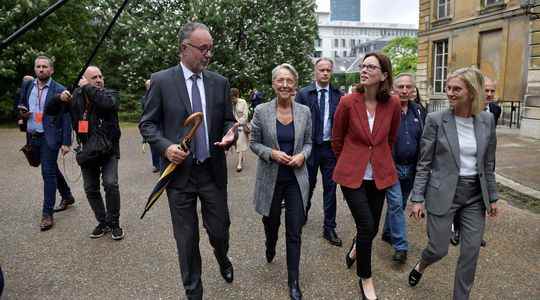Defuse fears, already. Barely three days after the appointment of the government, the trio of ministers responsible for giving a green boost to Emmanuel Macron’s second term was already in front of the cameras this Monday, May 23. From the Natural History Museum in Paris, Prime Minister Élisabeth Borne, flanked alongside her by Amélie de Montchalin and Agnès Pannier-Runacher, carried out a first exercise in clarifying the roles of each. The organization, promised by the president before his election, was expected. The Ministry of Ecological Transition, occupied by Barbara Pompili during the previous five-year term, is being replaced by two ministries – that of Ecological Transition and Territorial Planning, occupied by Amélie de Montchalin; and another dedicated specifically to the energy transition and occupied by Agnès Pannier Runacher. All this, overseen by the tenant of Matignon, who herself has a mandate for ecological planning and helped in this direction by the creation of a general secretariat for planning entrusted to Antoine Pellion.
“An unprecedented organization”, welcomed this Monday Elisabeth Borne. The announcement of the composition of the government had however raised some eyebrows. On the structure first. Three ministers, as many cabinets and advisers, subjects which are obviously cross-cutting and overlapping… it generally does not take more in an already hypertrophied administration to generate cacophony at all levels. The Prime Minister did little to dispel doubts in her introductory remarks. Explaining that Amélie Montchalin would carry “all the territorial variations of ecological transition policies in very concrete areas such as housing, transport and then Agnès Pannier Runacher, whose roadmap is simple: getting out of fossil fuels.” Fossil fuels that are obviously found in all sectors of society, starting precisely with… housing and transport.
Silo reasoning?
A few minutes after the announcement of the new executive, the lawyer specializing in environmental issues, Arnaud Gossement, considered the new organization suspicious: “We will continue to think in silos: energy and the climate on one side, the rest of the ecological issues (nature, waste, agriculture, sea, forest) on the other. Unrelated to all these issues. The opposite of what the IPCC advocates, “he explained on Twitter. Some experts are more nuanced: “The organization is a priori coherent and favorable. Ecological planning is at the center of the game, placed at the level of the executive thanks to the general secretariat at Matignon. Cut the subject with on one side a minister which is aimed at communities and another at industrialists is not stupid either, even if we have to wait for the final allocations”, confides Matthieu Auzanneau, general manager of the Shift Project. These will be published in the coming days. And, it is to be hoped, will make it possible to dispel the last doubts as to the final organization on the side of the Hôtel de Roquelaure where the two ministers will sit. “There is a minister who will work on the carbon-free energy supply aspect and the other on the reduction of demand, it is interesting”, engages Benoit Léguet, director of the Institute of the economy for the climate. .
Will remain, and the task is not easy, to put all the ministries to work. Then to reaffirm the importance or even the pre-eminence of the ecological subject even when it hits the economic subject. Transport, industry, housing… on all these subjects, many morocco dealers in Roquelaure had to resign themselves to leaving arbitration to the Ministry of Economy and Finance under the Fifth Republic. “Historically, Bercy has judged that it is not bound by the achievement of climate objectives and that its interests must predominate”, confides a good connoisseur of mysteries. Which adds “Elisabeth Borne’s mandate precisely specifies the conduct of ecological planning, which was not the case for Jean Castex. This could change the situation, both on the framework letters of new ministers and arbitrations” . “All the ministers will each have a roadmap”, promised Elisabeth Borne on Monday. Charges its General Secretariat to slap on the fingers of the recalcitrant.
A pilot waiting for the plan
From the 2023 budget with the 10 billion annually promised for the transition to the climate energy programming law which must review the objectives of reducing greenhouse gas emissions sector by sector, through the reform of the Agricultural Policy commune, the executive and its three ministers know they are expected at the turn. “We now have a pilot, a project with the objective of -55% reduction in greenhouse gases. We now need a plan, a program of expenditure to carry out this plan, and strategic planning to prepare for the unforeseen events”, confides Benoit Léguet. “What we fear is a lack of ambition put at the service of an incomplete diagnosis. For the moment, I do not see any lessons drawn from the dysfunctions induced by the new mechanisms of the electricity market or the question of sobriety. Nor for employment policy, yet central, or what must become of the agricultural model”, notes for his part Matthieu Auzanneau.
For many NGOs and even politicians, the liberal-pragmatic profile, a priori without experience in ecology, of the two new ministers is not reassuring. “These ministers who come to ecology or energy, have never shown the slightest interest in ecology, climate and biodiversity”, tackled shortly after the announcement of the appointment the secretary general EELV, Julien Bayou. It is true that after Nicolas Hulot, François de Rugy and Barbara Pompili under the previous five-year term, Emmanuel Macron decided to no longer draw from environmentalists for his casting.
This trial of intent, however, leaves our expert quoted above unmoved. “For the private sphere, these two profiles are perhaps an asset. For this ministry, the question is not to have an ecological profile. In the past, it has not been so successful. You need a bulldozer. Someone who puts method into it, and who isn’t likely to be labeled Khmer Vert by the opposition.” Not having the confidence of environmentalists, the two ministers, reputed to be hard-working, will only be able to harvest it with results.
